Text

Courtesy of Classic British TV on Facebook. :)
11 notes
·
View notes
Text
youtube
A clip from the 1998-2000 sitcom, Dinnerladies, written by and starring the late Victoria Wood.
Here Dolly (played by Thelma Barlow) realises there has been a bit of a mix up with her artificial sweeteners...
#victoria wood#dinnerladies#british comedy#social history#Dolly's cup of tea#british tv writers#british cinema#british theatre#british culture
20 notes
·
View notes
Text
youtube
Arthur Lowe (1915 - 1982) is widely remembered for his comic genius on television, in feature film and on stage, but was also a supremely talented dramatic actor. At the height of his success as Captain Mainwaring in Dad's Army, he made an understated but poignant cameo appearance in the Thames political drama, Bill Brand, which was broadcast during the summer of 1976. At that time, Arthur Lowe himself was on tour with the stage production of Dad's Army. In Bill Brand, written by Trevor Griffiths, he played exhausted and ill Labour Prime Minister, Arthur Watson, in the dying days of his leadership.
According to BFI online;
"...Bill Brand is a breath-taking series. Transmitted during the boiling summer of 1976, at peak-time between World in Action and News at Ten, it engaged with contemporary politics in a dramatic way, but remained consistently intelligent, and far from talking down to its viewers, assumed that they were a vital part of the political processes described, and as committed to understanding how things might therefore improve..."
Bill Brand starred Jack Shepherd in the title role, along with Lynn Farleigh, Rosemary Martin, Cherie Lunghi, Alan Badel, Geoffrey Palmer and Colin Jeavons.
Arthur Lowe passed away on April 15th, 1982, having suffered a stroke while backstage at the Alexandra Theatre, Birmingham, the previous evening.
#arthur lowe#dads army#classic tv#political drama#1970s tv#british actors#coronation street#british culture#british theatre
18 notes
·
View notes
Text
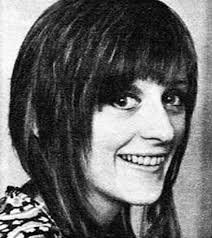

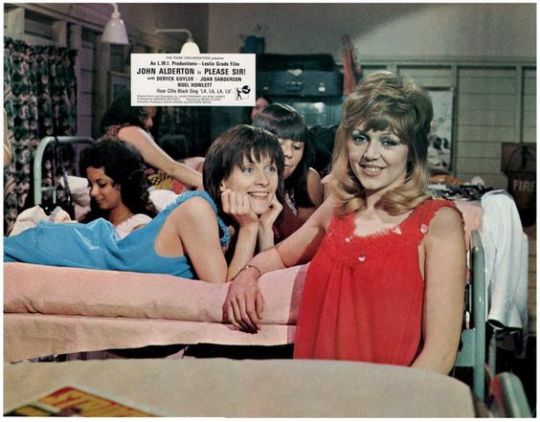
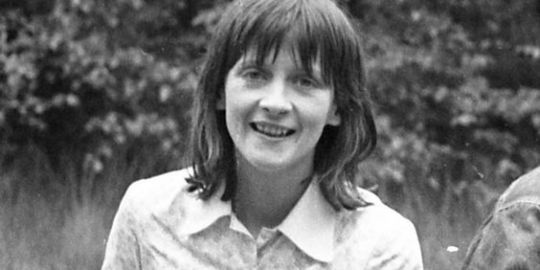
Remembering Liz Gebhardt, born April 12th, 1945, who found lifelong fame as Maureen in the LWT sitcoms Please Sir and Fenn Street Gang, as well as the successful movie adaptation of Please Sir.
She was active in British television from 1966 to 1994, with roles in The Naked Civil Servant, The Bill, with Rodney Bewes in Dear Mother Love Albert (not an altogether happy experience, according to David Barry's memoir, Please Sir: The Official History), Grange Hill, and a memorable cameo in Keeping Up Appearances. Her final credited television appearance was in 1994, in Love Hurts.
She passed away in 1996, aged 51, reportedly from injuries sustained during radiotherapy treatment for breast cancer. She was married to actor and theatre director, Ian Talbot.
#Liz Gebhardt#please sir#british actors#british comedy#british culture#london weekend television#british cinema#british theatre#fenn street gang#social history#working class history
12 notes
·
View notes
Text
With the recent sad passing of Ian Lavender, the last of Dad's Army's 'Magnificent Seven', it's interesting to note that what might be seen as one of his signature episodes, The Deadly Attachment, was adapted as a pilot for an American version of the series, The Rear Guard.
One of Ian Lavender's own favourite episodes was Ring Dem Bells (1975). The platoon are engaged as extras for a military training film, and to Captain Mainwaring’s disgust they are cast as enemy soldiers.
Ian Lavender’s standout, joyously comic performance as a Nazi officer was singled out for particular acclaim in BBC audience research.

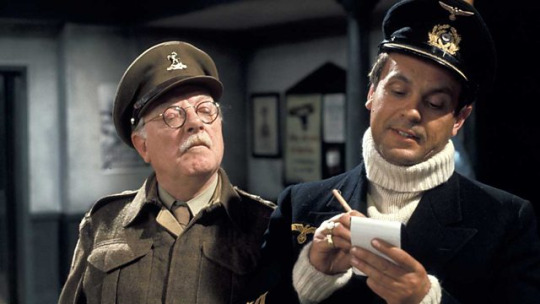
Many golden age British sitcoms were recast and adapted for the US market; Steptoe and Son became Sandford and Son, Man About the House became Three's Company, 'Til Death Us Do Part became All in the Family, and For the Love of Ada became A Touch of Grace.
Some found lasting success, while others never made it past the US pilot stage. One that sank like a stone was The Rear Guard, a 1976 attempt to recreate the success of Dad's Army.
With the original cast busy with the Dad's Army stage tour during 1976, Writers Jimmy Perry and David Croft were invited by ABC (America) to submit a script, and they chose, from a catalogue of over 70 episodes by this point, an adaptation of probably the most famous and best-remembered, The Deadly Attachment, from 1973, in which Philip Madoc played a captured U-Boat captain, confined with his crew by the Home Guard awaiting transfer to a POW facility.
When the U-Boat captain demands Private Pike's name for insulting Hitler, Captain Mainwaring calls, "Don't tell him, Pike!", a moment that is often rated just behind Del-Boy falling through the bar as one of the funniest moments in British comedy.
The Home Guard was reimagined as a WWII civil defence unit for the American version, guarding against an invasion of the US mainland. Notable cast members included Eddie Foy Junior, a member of the famous Vaudeville family, who played Bert Wagner (Cpl Jones), Captain Mainwaring became Nick Rosatti (Cliff Norton) and Private Pike became Bobby Henderson, played by Dennis Kort.
(Yep, Nick Rosatti did call out, "Don't tell him, Henderson!")
The platoon sergeant, Raskin, was played by Lou Jacobi, and the likeable villain (Walker), became Don Crawford and was played by John McCook, who has since carved out a long career in The Bold and the Beautiful and won a daytime Emmy for most outstanding actor in 2022.

The pilot aired on US television in the summer of 1976, but was not particularly well received. The network wiped the master tape, although copies are held in private collections.
In a later interview, Jimmy Perry and David Croft recalled that, when they arrived in the US, they were picked up from the airport in a limousine and generally treated like royalty by the network.
They had to find their way back to the airport in a cab.
#social history#british television#dads army#british comedy#classic tv#british culture#don't tell him pike
15 notes
·
View notes
Text
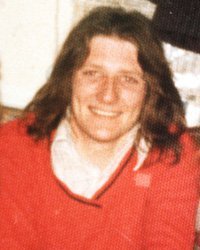
On April 10th 1981, BBC news reported that ‘imprisoned IRA hunger striker’ Bobby Sands had been elected to the House of Commons as MP for Fermanagh and South Tyrone, defeating the Ulster Unionist candidate by a margin of 1446 votes. The path to victory was cleared by the withdrawal of the moderate Catholic Social Democratic and Labour Party, so as not to split the nationalist vote.
Bobby Sands, who was four years into a 14 year sentence on firearms offences, stood for parliament on an Anti H-Block platform, referring to the division of Maze Prison holding those convicted of sectarian terrorism offences. He was also already 41 days into a hunger strike, initiated in the cause of improving brutally harsh conditions, and for a reclassification of their status to that of political prisoners. (The 'special category' status had been revoked in 1976 by Labour Prime Minister Harold Wilson). According to the BBC, he was already too weak at this point to leave his bed in the prison infirmary.
His election agent, (and subsequent MP for the same constituency) Owen Carron, stated:
“…The Nationalist people have voted against Unionism and against the H Blocks. It is time Britain got out of Ireland and put an end to the torture of this country…”
Bobby Sands died on May 5th, 1981.
The Thatcher Government’s public position was that they might be receptive to some reform of prison conditions, but refused to enter negotiations or grant any concessions while the hunger strike continued. Attempts at mediation were made by Pope John Paul II, the European Human Rights Commission, the Irish Commission for Justice and Peace, and the International Red Cross. By October, 10 of the hunger strikers had died, while five prisoners were saved after their families, supported by the Catholic Church, granted permission for medical authorities to intravenously feed those who had lost consciousness.
After the strike ended, the Government announced some measures toward regime improvements. Despite the public hard-line position, some secret negotiations had been occurring through an MI6 agent, while Jim Prior, Secretary of State for Northern Ireland, drove a more conciliatory approach.
The classification to political prisoner status was one compromise not considered, with Margaret Thatcher famously stating, "Crime is crime is crime. It is not political. It is crime. There can be no question of political status." She also said, "Mr Sands was a convicted criminal. He chose to take his own life. It was a choice that his organisation did not allow to many of their victims."
The Representation of the People Act was also amended, preventing other H-Block prisoners, or any prisoner sentenced to more than one year, standing for parliament.
One hundred thousand mourners attended Bobby Sands' funeral.
(Sources: BBC On This Day. Peter Taylor (BBC): "Bobby Sands: The Hunger Strike that Changed the Course of N Ireland's conflict".
#the troubles#northern ireland#uk politics#social history#working class history#history#margaret thatcher#thatcherism
28 notes
·
View notes
Text
I missed an important human aspect of the Canberra's involvement in the Falklands War when I first posted this last year - the friendships that were made on the outbound voyage between the civilian volunteer crew and their military passengers:
This is from Royal Marines History:
"...Crew looked out anxiously for faces they knew; more than 250 British servicemen had died winning back the islands. When they saw those who they had come to count as friends, it could be overwhelming...
"...Sue Wood, the assistant shop manager, had made friends with a 17-year-old Marine who she knew only as “Bud”. Suddenly, she saw him coming back aboard. "When I saw him and he looked at me, I just said, 'It's good to see you' I couldn't say anything else.'..."
Here is a current photo of actor William Scott-Masson, son of Captain Dennis (DJ) Scott-Masson, from the website of his agent.

Image: Stanton Davidson Associates

In early April, 1982, the P&O Liner, Canberra, was on a Mediterranean cruise when her captain, Dennis (DJ) Scott-Masson, received orders to put in at Gibraltar. He there received instructions to proceed immediately to Southampton under Admiralty orders. (It's unclear exactly where the poor passengers were kicked off).
Within a week, and after a hasty refit which included the installation of helipads, the Canberra set sail for the Falklands, with a reduced volunteer crew and, depending on the source, either 2 000 or 3 000 commandoes of the Royal Marines and Parachute Regiment.
She was taken close inshore in San Carlos Water on May 21st, the first of three occasions, to disembark the troops.
Captain Scott-Masson was later interviewed for the ABC Australia documentary series, Liners: Ships of Destiny. He recalled;
"...Our major fear was that we would be hit by bombs or an Exocet, the ship’s superstructure was built of aluminium, and fire would have been our worst hazard, and that is what we worried about..."
He also conceded that the extreme danger did slightly disrupt shipboard routine;
"...There was one night we didn’t have a drink with dinner, didn’t have wine with dinner... was the night we went into San Carlos..."
The QEII was also on troopship duties, but remained well outside of the battle zone, her own contingent of Guards, Gurkhas and Blues and Royals shuttled from her position off South Georgia in the Canberra.
A contributor to Liners: Ships of Destiny explained why;
"...(The QEII) couldn’t really be exposed to danger, the thought of risking losing the ship that had the same name as the Sovereign was more than the politicians could bear. The fact that the Canberra was exposed didn’t really matter, after all it was only the capital of Australia..."
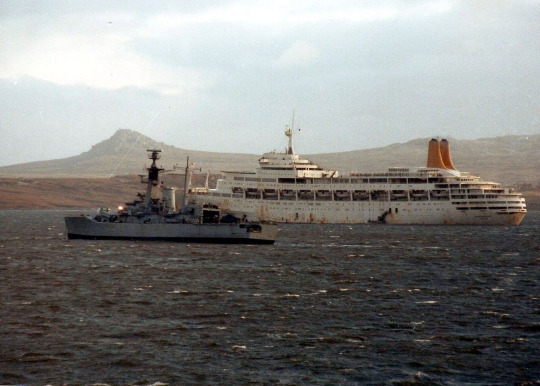
The Canberra and 2500 troops returned safely to Southampton on July 11th, welcomed by around 250 000 people.

The Canberra was paid off in 1997, after 36 years of service.
Captain Scott-Masson passed away in 2010, aged 81.
Captain Scott-Masson's son is the actor, William Scott-Masson

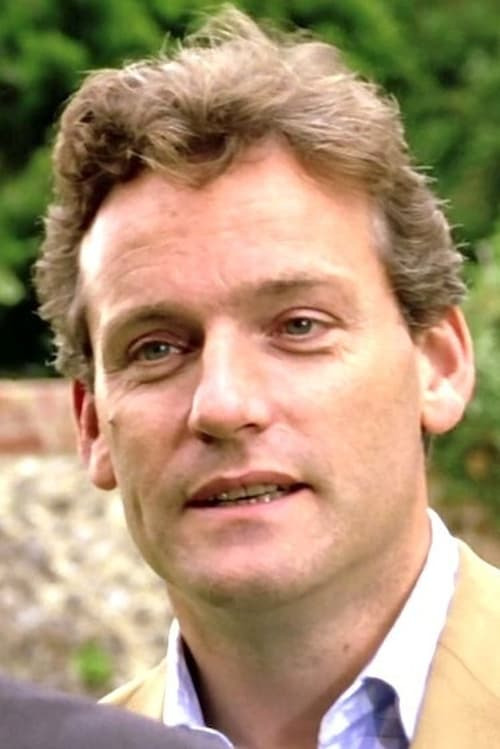
Additional background from Royal Marines History and https://www.peterghore.co.uk
#falklands war#maritime history#social history#ocean liners#royal marines#military history#1980s#margaret thatcher#parachute regiment#cruise ship#canberra#falkland islands#las malvinas
85 notes
·
View notes
Photo

Towards the end of March 1963, Dr Richard Beeching presented his controversial report on the future of Britain’s railways. British Railways (Soon to be renamed British Rail) was at that time losing 140 million pounds each year, and Board Chairman, Dr Beeching, was determined to ‘make the railways pay’.
The report found that only one half of the network’s services were financially viable, and accounted for 98 % of total passenger numbers. One quarter of the total traffic began at just 34 stations out of a total of 7 000.
The Beeching report argued that approximately 2 000 unviable stations should close immediately, and 250 train services cease running. Some stations were on small branch lines, but others identified for closure were in Edinburgh, Glasgow and Liverpool. The report called for major reductions in services to the Scottish Highlands, Wales, and the West of England. Dr Beeching told reporters that he anticipated the first closures would take place within months, that 70 000 jobs would be lost, and metropolitan fares in London would jump by at least 10 %.
Officially, the Conservative government welcomed the report, but not everyone was happy. Mark Woodnutt, Conservative MP for the Isle of Wight, threatened to resign over the proposed loss of the island’s railway. The chairman of the National Council on Inland Transport, Labour Peer Baron Stonham said;
“…Far from gearing the railways to the needs of the 1960s, it will in some areas reduce public transport to a lower level than in the horse age…”
There was a change in government in 1964, with Labour coming to power for the first time since 1951. After producing a second report in 1965, Beeching resigned over differences with the new Wilson government. Despite widespread protests against line and station closures, and hopes that the new government might see things differently, cuts outlined in Beeching’s original report were enacted. According to the BBC, a total of 2128 stations were closed, and 67 700 jobs were lost.
#british rail#british railways#modern history#railways#public transport#social history#UK politics#1960s#transport#UK government#working class history#british culture
13 notes
·
View notes
Text
Thanks to @robbielewis for this additional context.
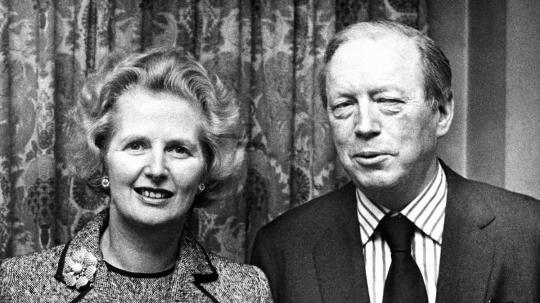

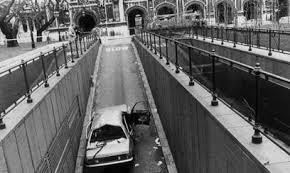
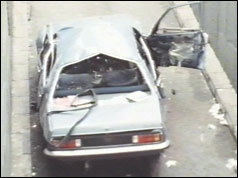
On March 30th, 1979, BBC News reported:
"...Shadow Northern Ireland Secretary Airey Neave has been killed by a car bomb as he left the House of Commons car park. The bomb, said to be highly sophisticated, exploded as Mr Neave began driving up the exit ramp…So far two groups, the Provisional IRA and the Irish National Liberation Army, have claimed they carried out the killing…"
Airey Neave suffered catastrophic injuries and subsequently died at Westminster Hospital. The assassination coincided with the beginning of the general election campaign, and he was set to be Northern Ireland Secretary in the event of a Tory win. He was known as a proponent for using strong military force against Irish republican paramilitaries. The INLA (who it appears were the real culprits), in their justification, described this as 'rabid militarist calls for more repression against the Irish people'.
Margaret Thatcher, Tory Opposition Leader, described Airey Neave as 'one of freedom's warriors. Courageous, staunch, true. He lived for his beliefs and now he has died for them'.
Labour Prime Minister (although not for long), Jim Callaghan, promised that 'No effort will be spared to bring the murderers to justice and to rid the United Kingdom of the scourge of terrorism'.
Airey Neave was a decorated World War Two veteran (MC and DSO) who had achieved the rank of Lieutenant Colonel. He was the first British officer to escape from Colditz Castle.
In April 2019, The Express and other media reported that the investigation into the assassination would be reopened, with focus on a person of interest named Harry Flynn who’d been previously identified as the INLA’s chief of staff. According to the Belfast Telegraph, Britain had attempted to extradite Flynn from France in 1987 where he was serving five years for gun running, but 'failed as his crime was deemed political'.
As of 2019, according to reports, Flynn was aged 65 and ran a pub in Mallorca. There doesn’t appear to be any further reporting on this, so we can assume the case is still open.
14 notes
·
View notes
Text




On March 30th, 1979, BBC News reported:
"...Shadow Northern Ireland Secretary Airey Neave has been killed by a car bomb as he left the House of Commons car park. The bomb, said to be highly sophisticated, exploded as Mr Neave began driving up the exit ramp…So far two groups, the Provisional IRA and the Irish National Liberation Army, have claimed they carried out the killing…"
Airey Neave suffered catastrophic injuries and subsequently died at Westminster Hospital. The assassination coincided with the beginning of the general election campaign, and he was set to be Northern Ireland Secretary in the event of a Tory win. He was known as a proponent for using strong military force against Irish republican paramilitaries. The INLA (who it appears were the real culprits), in their justification, described this as 'rabid militarist calls for more repression against the Irish people'.
Margaret Thatcher, Tory Opposition Leader, described Airey Neave as 'one of freedom's warriors. Courageous, staunch, true. He lived for his beliefs and now he has died for them'.
Labour Prime Minister (although not for long), Jim Callaghan, promised that 'No effort will be spared to bring the murderers to justice and to rid the United Kingdom of the scourge of terrorism'.
Airey Neave was a decorated World War Two veteran (MC and DSO) who had achieved the rank of Lieutenant Colonel. He was the first British officer to escape from Colditz Castle.
In April 2019, The Express and other media reported that the investigation into the assassination would be reopened, with focus on a person of interest named Harry Flynn who’d been previously identified as the INLA’s chief of staff. According to the Belfast Telegraph, Britain had attempted to extradite Flynn from France in 1987 where he was serving five years for gun running, but 'failed as his crime was deemed political'.
As of 2019, according to reports, Flynn was aged 65 and ran a pub in Mallorca. There doesn’t appear to be any further reporting on this, so we can assume the case is still open.
#social history#uk politics#british culture#uk government#terrorism#history#uk parliament#modern history#uk history
14 notes
·
View notes
Text
Any excuse for a little vintage bus action... Thanks @master-john-uk
Corfe Mullen, Dorset 1960's - The church bus.
The 13th Century St Hubert's Church is in the old village of Corfe Mullen, which is some distance from the main residential area which grew in the Corfe Hills following WWII.
The new vicar hit upon the idea of buying and restoring an old bus to provide free transport to parishioners. In those days, buses of any size could be driven by anybody with just a car licence... provided they did not carry fare paying passengers.
In 1995 St Nicholas Church opened in the urbanised area of Corfe Mullen, making it one of the few parishes with two church buildings.
29 notes
·
View notes
Text
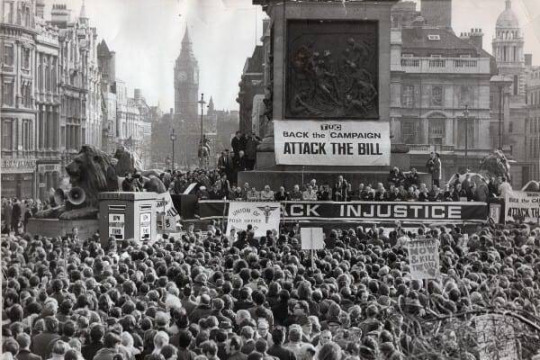
On March 1st, 1971, there was an unofficial ‘day of protest’ in response to the Heath government’s attempts to curb trade union power through legislation.
The BBC reported;
"…Hundreds of thousands of workers across Britain have taken part in an unofficial day of protest against the government’s new Industrial Relations Bill. Figures suggest over 100,000 workers walked out on strike in London alone - although only a tiny proportion of that number, about 2,000, joined a march through the capital. Some reports suggest as many as 1.5 million people stopped work across the country. The protest is the latest and biggest demonstration so far against the bill, which includes proposals for a strike ballot and a cooling-off period before any industrial action, as well as tighter controls on union agreements and membership…"
The proposed legislation also wanted to do away with ‘closed shops’, but later reports suggested the government was open to compromise on this point. A number of industrial unions were involved in the march, including boilermakers, printers and electrical workers. Postal workers were already on strike and joined in, and no national newspapers were printed that day.
The protest also targeted the Trades Union Congress headquarters, angry that the strike had not been endorsed at TUC level.
A week later, 10 000 workers took part in a second protest in Glasgow. The rally was addressed by Vic Feather, General Secretary of the TUC, who was made to feel distinctly unwelcome owing to the peak union body’s position, which opposed the bill but did not support the current strike action.

He told the rally;
"…I hope very much there will be judges in the House of Lords who will point out the dangers in this bill, not only to the legal profession, but to the principles of democracy because this bill is not just an attack on the trade union movement, it is a limitation of free speech and a limitation of democratic action…"
Several weeks earlier, the home of Employment Secretary, Robert Carr, the leading government negotiator, had been bombed as part of a campaign by the Angry Brigade. No one was injured, although his wife and youngest daughter were home at the time.
A little more on the bombing and the aftermath here.
#social history#working class history#uk politics#1970s#uk government#trade unions#protest#industrial action
18 notes
·
View notes
Text

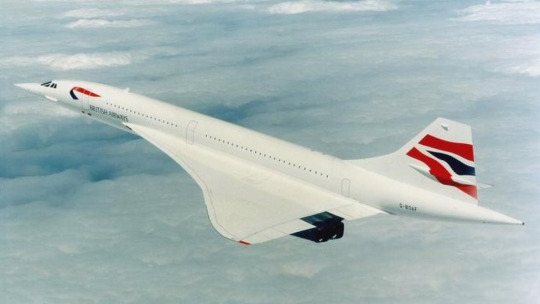
On March 2nd, 1969, the Concorde made, according to BBC reporting, a 'faultless' maiden flight.
"...The Anglo-French plane took off from Toulouse and was in the air for just 27 minutes before the pilot made the decision to land...The test flight reached 10 000 ft (3 000 m), but Concorde's speed never rose above 300 mph (480 kph). The plane will eventually fly at a speed of 1 300 mph (2 080 kph)..."
A further test flight was held in Britain five weeks later, and it successfully reached supersonic speed that October.
Concorde was an Anglo-French co-partnership, although the British government was having serious misgivings over budget blowouts, predicting it could cost as much as 900 million pounds. By the time of the first test flight, 155 million pounds had been invested by Britain, with hopes that commercial flights could begin by 1973. It was anticipated that transatlantic flying time would be cut from nearly eight hours to around three and a half hours.
The first commercial flights eventually took place on January 21st, 1976. British Airways flew from London Heathrow to Bahrain, and Air France from Paris to Rio.
Concorde was not economical to fly, and on-board fuel storage was limited, meaning that it could not fly across the Pacific, compromising its potential profitability.
Following the crash of an Air France Concorde in 2000, which killed 113 people, the aircraft continued flying following safety modifications. By 2003, in the wake of declining passenger numbers and rising operating costs, both British Airways and Air France took Concorde out of service.
#concorde#aviation#aviation history#aviation lovers#british culture#social history#british airways#airlines#air travel#industrial history#air france
17 notes
·
View notes
Text
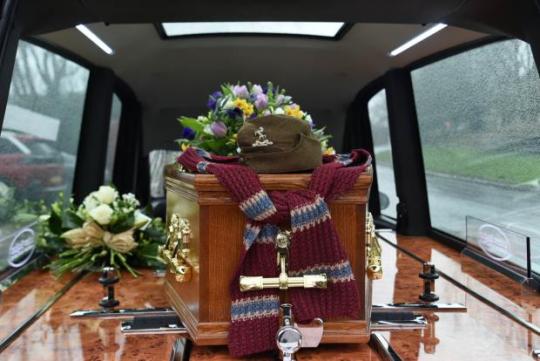
Pikey's forage cap and scarf accompanied Ian Lavender on his final journey...
11 notes
·
View notes
Text

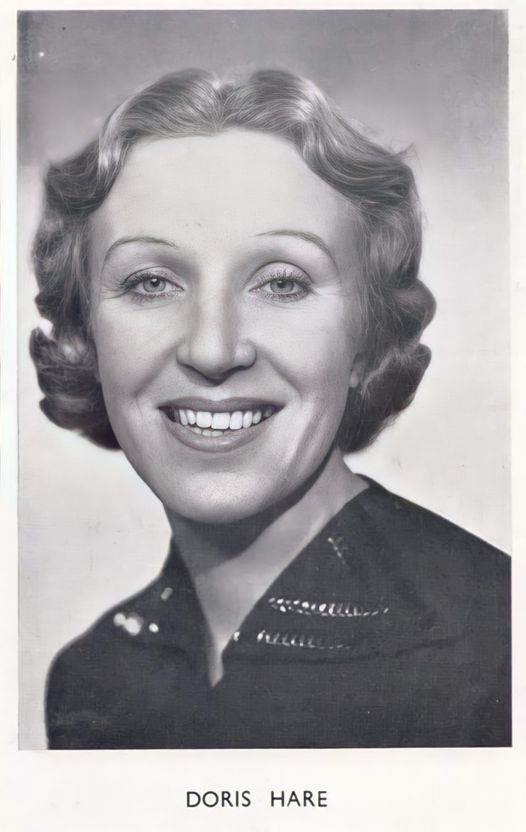
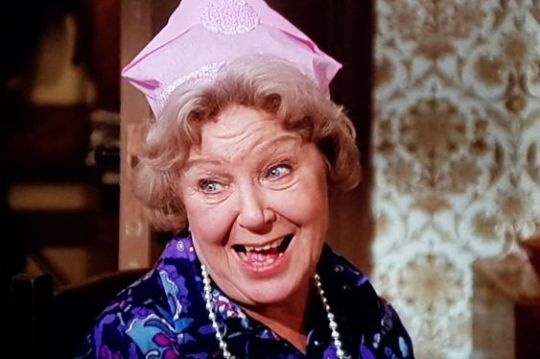

Remembering Welsh entertainer Doris Hare MBE, born March 1st, 1905.
She was born into a travelling theatrical family and made her stage debut in a speaking role aged three, then worked for decades in music hall, variety and musical theatre, and in the 1960s for the Royal Shakespeare Company and National Theatre.
During World War Two she hosted a radio programme especially for merchant mariners, Shipmates Ashore, and became 'the Sweetheart of the Merchant Navy', for which she was awarded the MBE.
She found later fame as 'Mum' in On the Buses, on television and in the cinema adaptations (1969-73), and in three 'Confessions' sex comedies, which were some of the most profitable British films of the 1970s.

Her film career spanned 60 years, from Night Mail in 1935 to her final credit, Second Best, directed by Chris Menges and starring William Hurt and Keith Allen, in 1994.
According to a tribute in the Borehamwood and Elstree Times:
"...At the grand age of 87, Doris Hare was to take to the West End stage one last time. Doris appeared at the Playhouse Theatre in the Ray Cooney farce, It Runs in the Family. The role saw her reunited opposite former Benny Hill straight man, Henry McGee..."
She passed away at Denville Hall, the residential care home for artistes, on May 30th, 2000.
#social history#british culture#british theatre#british television#music hall#musical theatre#variety#british comedy#on the buses#confessions#british cinema#doris hare#welsh actors
5 notes
·
View notes
Text
Thanks @robbielewis.
A treat for @georgefairbrother A lovely tribute to Dave Myers, one of the Hairy Bikers. Probably two of the most humourous and nicest blokes on the telly. Dave is greatly missed.
From the Daily Mail
Hairy Biker Dave Myers' wife Liliana pays tribute to her 'wonderful, brave man' - adding 'Till next time we meet' in heart-wrenching post after his cancer death at 66
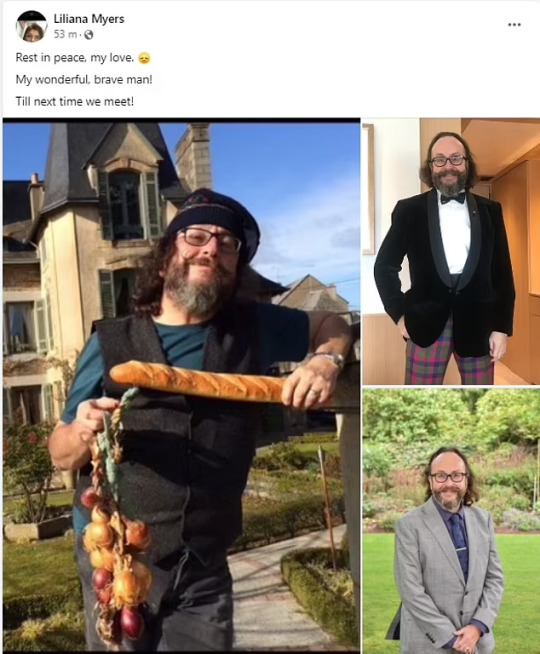
Dave is pictured with Liliana on their wedding day in 2011, alongside his best man Si

The chef announced he was receiving treatment for cancer in May 2022 and bravely kept the public up to date with his progress in a series of emotional TV specials. Pictured: Dave and his wife Liliana

On the latest episode of The Hairy Bikers Go West, Dave and his co-star Simon 'Si' King explored West Kirby, Wirral

Dave poses over a Christmas dinner alongside his stepdaughter Izabelle
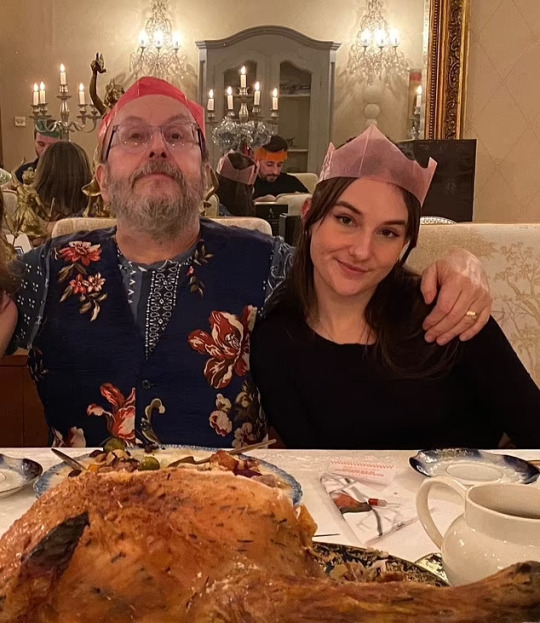
Dave Myers poses with Si and his stepson, Sergiu

Si also shared this black and white photo of him sitting with Dave on a bench

Karen Hauer and Dave Myers performing during rehearsals for the BBC programme Strictly Come Dancing 2013

Dave Myers and Si King The Hairy Bikers at the Basingstoke Festival of Food in 2009

Camilla, Duchess of Cornwall (C) and Hairy Bikers Dave Myers (L) and Si King (R) attend the British Food Fortnight Secondary School Competition at Clarence House, on January 27, 2011
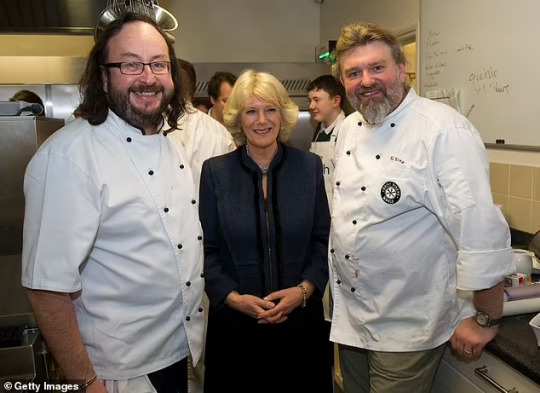
Dave Myers (left) and Simon King chow down on a crab and a lobster in a photoshoot on their iconic motorcycles
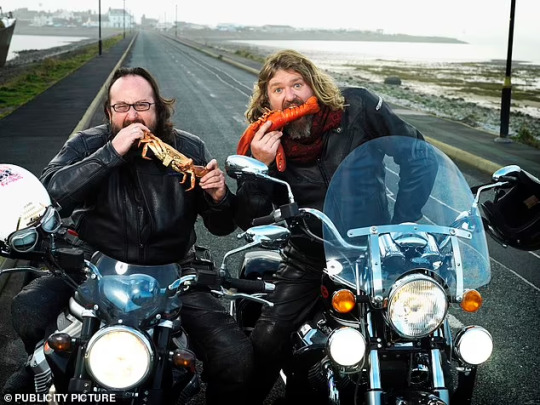
The pair took part in the Platinum Jubilee Pageant, riding on top of one of the National Treasures buses through London
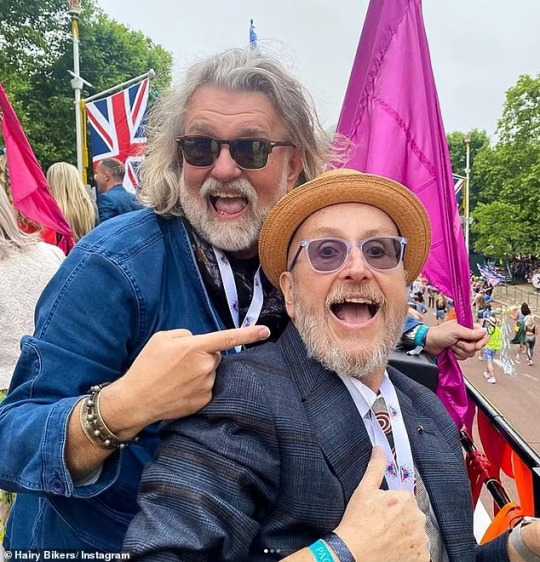
Dave looks chipper on This Morning in 2023 as he prepares food for the show

Si King and Dave Myers in their BBC cooking programme, The Hairy Bikers: Coming Home for Christmas

Si King and Dave Myers in their final BBC cooking programme, The Hairy Bikers Go West
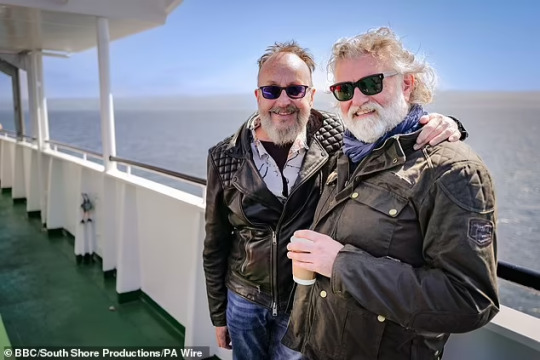
Dave Myers and his wife Liliana Orzac attend the Caudwell Children's Butterfly Ball in 2014

Hairy Bikers Simon King (left) and Dave Myers wearing this year's special Red Nose Day aprons in support of Comic Relief
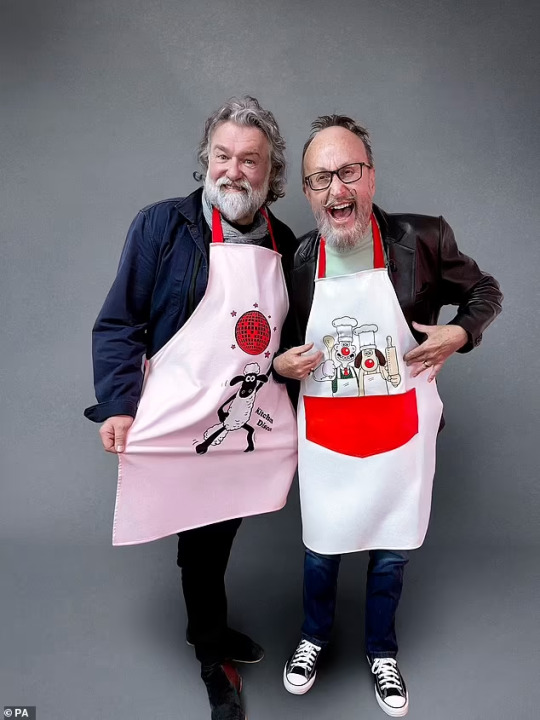
The chef became a fan favourite as he starred on Strictly, partnering with Karen Hauer
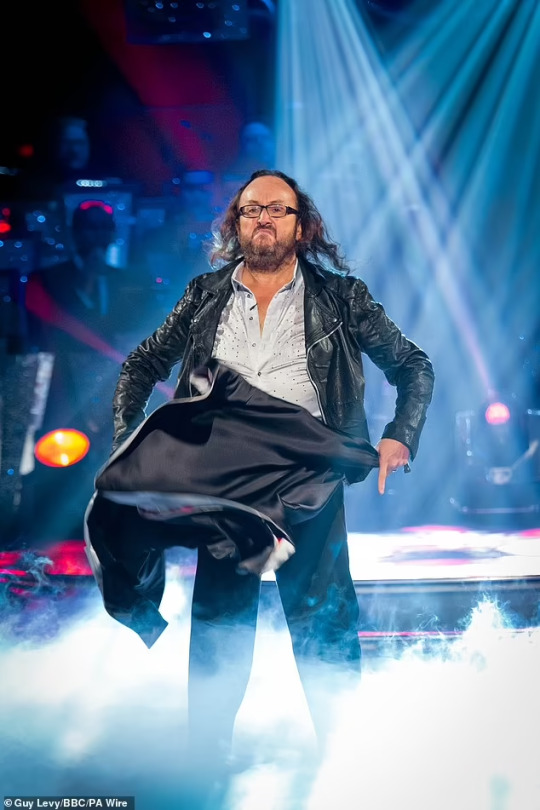
Si King and Dave Myers Hairy Bikers 'Mums Know Best' Book Signing, Reading, in 2010

Dave Myers and dance partner Karen Hauer during Strictly rehearsals at the Royal Academy of Dance, in Battersea

Dave Myers and Karen Hauer practising Anti-Gravity Yoga on 'Strictly Come Dancing'

Dave Myers and Si King promote their cookbook in 2006, at the same time as their first BBC series
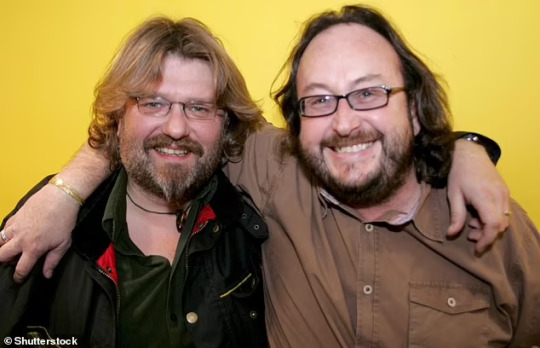
Dave Myers aged eight with his mother Margaret, who suffered from multiple sclerosis

Myers competed in Strictly Come Dancing in 2013 alongside professional dancer Karen Hauer

Dave as a baby with his mother Margaret. He taught himself how to cook after she fell ill
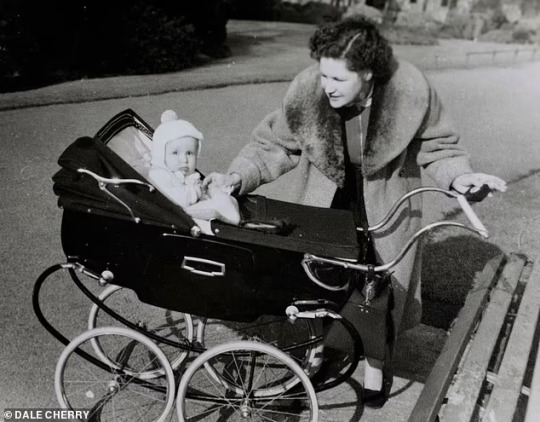
25 notes
·
View notes
Text
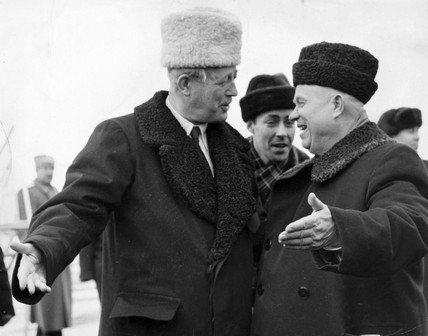
On February 23rd, 1959, BBC News reported that;
“…Britain and the USSR have expressed a willingness to expand Anglo-Soviet trade and cultural ties during the first official meeting between British Prime Minister Harold Macmillan and Soviet Premier Nikita Khrushchev…On the second day of his ten-day visit to the USSR - the first by a British Prime Minister since Winston Churchill during the war - Mr Macmillan was driven to the Kremlin this morning for talks…”
The topics up for discussion were "cultural matters of interest between the two countries", and ways to encourage the exchange of literature, film and study, the ceasing of nuclear tests and establishing agreements towards disarmament, as well as the creation of a demilitarised ‘free’ zone in West Berlin, in the absence of a full reunification of Germany.
Not giving up easily, at a dinner at the British Embassy, ‘in a cordial atmosphere of goodwill’, Harold Macmillan piled on the diplomacy, praising the achievements of the Soviet Union and recalling the alliance against Nazi Germany;
"...When I reflect on the present situation in the world, I wonder whether we have not at least as great a common interest today. That common interest is peace. Somehow, in spite of the difficulties and obstacles, let us combine for peace..."
It appears that the cordiality and goodwill had limits, at least on the Russian side. Khrushchev snubbed further hospitality from the British delegation on the grounds of having to go ‘to the dentist for a filling’.
The BBC reported that this was only a ‘brief thaw’ in Cold War tensions, which worsened in line with the development of nuclear weaponry.
“…Peace talks in Paris in 1960 collapsed after the USSR shot down a US spy plane over its air space. Then two years later, the Cuban missile crisis brought the world to the brink of nuclear war. During Macmillan's visit no agreement was reached towards reuniting Germany and in 1961 the building of the Berlin Wall ensured east and west would remain firmly separate for almost 30 years…Harold Macmillan remained committed to curbing the arms race and played a major role in negotiating the Nuclear Test Ban Treaty of 1963, the first important treaty signed between the US, USSR and Britain since the end of the war…”
(Source BBC News and BBC On This Day)
#cold war#russia#soviet union#nuclear disarmament#foreign policy#foreign relations#harold macmillan#nikita khrushchev#british prime ministers#diplomacy#uk politics
10 notes
·
View notes